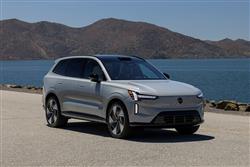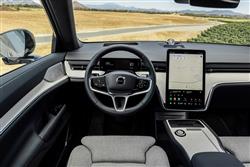Volvo EX90 - ABC Leasing
This is a sample, and will stop after 30 seconds.
SWEDE WITH A MISSION(some text hidden)
By Jonathan Crouch
Ten Second Review word count: 93
The EX90 is a large full-battery EV Crossover that has taken Volvo into a new era. As the company puts it, 'it's a statement for where we are - and where we're going', combining the brand's own engineering advances with 'the best technology from the world's best technologists'. This SUV is also one of the few large super-luxury EVs to be able to seat seven. It's an ambitious statement of intent from the Sino-Swedish brand. And now that this car has a proper 800V electrical architecture set-up, it's certainly worth a second look.
Background word count: 279
What does the future really look like for large luxury cars? Various brands have told us, but none of them are approaching that future quite like Volvo, the company proudly styling itself as 'a pioneer in the protection of people and planet'. A claim embodied most clearly in what was the first of the company's EVs to sit on a dedicated electric platform, this EX90. The original plan was for this to be the replacement for the combustion-powered XC90 large SUV model line that saved Volvo at the turn-of-the-century, though thanks to the slow pace of the EV revolution, that fossil fuelled model will now continue for several years yet. The future for flagship Volvos though, lies with EVs produced off the parent Geely Group's advanced SPA2 architecture, a platform already used by the EX90's close cousin, the Polestar 3 - and also by Volvo's similarly-sized ES90 saloon. Both cars share the same drive system and much else with this EX90, but this big Volvo SUV differs from those two other cars in its provision of three seating rows. The EX90 was first announced way back in 2023, but delay after delay meant that it didn't start filtering into UK showrooms until early 2025. In a form with an old-tech 400V electrical architecture and an older-tech Nvidia Xavier chip. We advised potential customers to wait for the properly upgraded Model Year 2026 version, which got a much faster-charging 800V electrical system and a considerably faster Nvidia Drive AGX Orin processor. As before, the car is built at the company's US plant in Charleston - and eventually be made at Chengdu in China too, with both plants rated carbon neutral.
Pictures (High res disabled)

.jpg)
.jpg)
.jpg)
.jpg)
.jpg)
.jpg)
.jpg)
.jpg)
.jpg)
.jpg)
.jpg)
